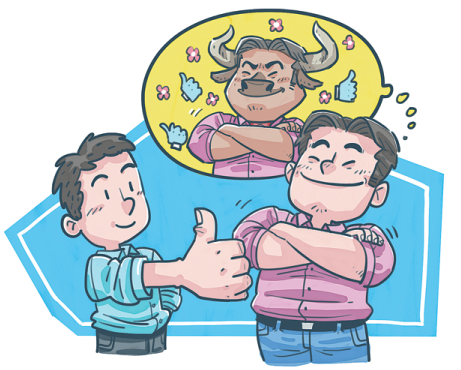Ox expressions get the bull by the horn

Considering the creature representing the coming 12 months, it is probably a good time to come up with appropriate Lunar New Year greetings. The Chinese character niu has now developed suggestions of "awesomeness" in the linguistic context.
Calling someone a niuren means they are awesome. Wishing someone niuyun means you hope they have a marvelous fortune. Now for the fun part. You could simply adopt the expression with a little wordplay, popular online twelve years ago, and bound to be again-Happy niu Year.
Comparing the phrases and idioms about this animal in Chinese and English, interesting generalities and particularities emerge in its rich complexity of implications.
An immediate commonality in the ox imagery concerns its size and strength. The English idiom "as strong as an ox" straightforwardly illustrates great physical strength.
Possessing "the constitution of an ox" proves that the world in certain ways shares a similar view about the ox in its representation of strength, stamina and stoicism.
In Chinese, we have similar expressions, but with an ingenious gift in exaggeration shown by ancient people, one ox seems far from enough. The idiom "tall as an ox and big as a horse" describes a tall and strong person, and "strength of nine oxen and two tigers" means spending tremendous strength and effort.
The magnitude of the ox has extended to expressions about the amount of human labor and technique involved in slaughtering them. The idiom "try the knife for slaughtering cattle", for example, means a capable person showing their talent by handling little things.
The story of an imperial butcher called Pao Ding dismembering an ox effortlessly has also been passed down to this day, referring to completing difficult tasks with dexterity after mastering the general principals through repetitive practice.
Probably because cattle are a profitable livestock around the world, the animal has been used in English financial terms such as cash cow, a business able to produce steady income, and the bull market, which has been adopted in China with its literal translation niushi. Appropriately, given the animal's positive connotations in Chinese culture.
It is interesting, however, that the ox is also used to describe the macabre figures in both Chinese and English context. In the English idiom "the black ox trod on one's foot", the black ox is a metaphor for a demon or bad luck.
The Chinese idiom "ox-head and horse-face", which uses vividly grotesque imagery to portray devils in the fantasy netherworld, is now also used to describe the diverse sorts of evil people in society.
The implication might contradict with the noble image of oxen in China, but it is understandable as this imagery in fact came from Buddhism provenance.
As for the modern implication for the word niu as an adjective, that can be roughly translated to awesome or awe-inspiring, no exact origin can be found, but it can probably be traced to the phrase chui niupi, "to inflate a cow", meaning to brag about one's abilities.
In some regions along the Yellow River, leather rafts were used as a means of transport, which required blowing air into a complete set of animal skin so that the inflated sacks could support the raft to float on water. Usually sheepskin was used, because cow skins were too big to inflate without external tools, hence the expression.
Therefore, because inflating a cow skin is such a remarkable feat, the shortened version niupi and the character niu itself became a metaphor for outstanding abilities that are used in everyday conversations.
Coming to the year of the ox, it's an opportune moment to compliment people as niu-it'll never go wrong.

Today's Top News
- Xi stresses key role of public opinion
- War-themed movies teach important lessons
- Xi urges studying, absorbing netizens' opinions in formulating 15th Five-Year Plan
- Yuan eyes greater role among safe-haven assets
- China set to clean up online health content
- China, EU can shape climate governance






























